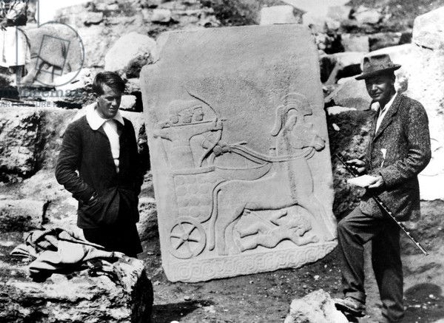29 january 2017Orrins, Orrins
I wonder if I ever told you about a magnificent storm we had at Carchemish one night - Mr. Hogarth and the [Cowleys] were staying with us? It was a very cold week, and after dinner we had all moved round the hearth, on which there was a big fire of olive logs burning: Busrawi had sent in his two musicians at our request. One was an old man, who had been a shepherd all his life. He had a long white beard, and a quiet, weather-beaten face: he played on a pipe about two feet long, that was of a [kind of] reed, but looked like polished brass. Its tone was hoarse, but flute-like, and had a wonderful range: [he goes from high to] very low notes which sound just like the wind dragging over a rocky hill-side, rustling in the dried grass of the valleys. The other is a younger man who plays a two stringed [several words illegible]: he is dark, and thin faced with very deep set eyes. I think he is blind: at any rate he has wound a massive turban and head-cloth over his forehead, so that his face is always in heavy shade . . . and he generally keeps his eyes shut as he sings.
They had been playing and singing Kurd war-songs and love-songs and dirges for about half an hour when the storm suddenly broke. There was a torrential burst of rain which hissed down in sheets, and rattled over the shingle in our court-yard like the footsteps of a great crowd of men; then there would come a clap of thunder, and immediately after a blue flash of lightning which made our open door and window livid gaps in the pitch-black wall . . . through which we caught odd glimpses of the sculptures outside shining in the rain and dazzle of light. I remember particularly the seven-foot figure of a helmeted god striding along an inscription towards the doorway: - and the dripping jaws of the two lions of the pedestal which seemed in the alternate glare and shadow of the flashes to be grinning at us through the window. The musicians did not stop, but changed their song for a wild improvisation which kept time with the storm. The pipe shrilled out whenever the thunder pealed and fell down again slow and heavy for the strained silences in between. One did not realise that they were men playing independently: the rhythm seemed so born of the bursts of wind and rain, so made to bind together the elements of the night into one great thunder-song. It all lasted about ten minutes, I suppose, but I think it was the most wonderful time I have had . . . and when it ended it ended suddenly: there was no quiet dragging away of the storm into distance and insignificance. - T.E. Lawrence, Letter to his mother, May 18th 1916 Compare John Buchan's description of a musical performance in Istanbul in his novel Greenmantle.
|

